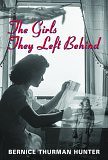Ah finals week. Stress stress stress stress... but, the final has been turned in and the group project given and now I have a whopping 6 days until fall semester starts.
Let's see... this weekend I went to Des Moines for my friend's wedding, which was lots of fun. While there, we went to the State Fair and you can read all about it all at Geek Buffet.
I had also forgotten what Iowa is like during primary season. Lots of Washington types were at the fair and Huckabee's Iowa headquarters was right by our hotel. Coming out of the airport, we saw a billboard that said "Are You Running for President?" Oiy. It might even be crazier than DC for your average-type person.
Anyway, I didn't review anything due to the stress of last week, so I'm quite behind! Let the catching up commence! So many books to talk about, I hardly know where to start. But let's start with some WWII YA novels, ok?
First up is The Girls They Left Behind by Bernice Thurman Hunter
Beryl/Natalie is a teenager in Toronto during the World War II. It's mostly written in diary form, but with a few-stand alone scenes scattered throughout--mostly towards the end of the book. The story deals with the feelings of always been left behind as she sees one more friend, relative, or neighbor off at the train station nearly every night--some of whom she will never see again. She drops out of school to work in an airplane factory and tries to go on with life, despite rations, black-outs, and no boys left to date.
Beryl (who hates her name and is trying to change it to Natalie, if only her friends and family would remember to call her as such) is a real voice dealing with the frustrations of always being left behind, of British girls snatching away the Canadian boys when they're stationed overseas, and in being laid off and having to go back to school when the war is over and the most of the boys come home. Her voice is very straight forward and matter-of-fact:
Dad had resurrected the Quebec heater from the garage and set it up in the kitchen so we would use less coal in the furnace. Coal was scarce these days because it was needed in factories like The Steel Company of Canada. Dad said the munitions factories practically ate it up by the ton.
I prefer more evocative prose and this language left me a little 'meh' on both the story and the character, but that's just me. I think it's still a good book about life on the home front and the hardships and heartbreaks the girls left behind had to endure.
Another book written with a similar voice that left me a little off is
For Freedom: The Story of a French Spy by Kimberly Brubaker Bradley
Based on the true story of Suzanne David, a teenager in Cherbourg, France, this is a first person narrative of a teenager turned Resistance spy. Suzanne is an aspiring opera singer who isn't that caught up in current events until Cherbourg beach is bombed while she's sitting on it. She watches one of her neighbors blow up and her best friend never recovers from the experience. Her strength in such an ordeal and the fact that her singing takes her throughout northern France leads the local resistance leader to recruit her as a spy.
Now, she's not reporting on troop movements or anything, but passing messages from one spy to another. There's the adrenaline rush as she walks past Nazi soldiers with a note about the Normandy landing in her hat, but the hardest part is being able to get to her scheduled meetings without her parents finding out. One of my favorite parts was when she had to pass a message but it was time to go to church and she had to find a way to get her parents to let her stay at home, as they had no idea what she was really up to.
A good story for younger teens/ tweens on the French resistance the role young people played. But, as with The Girls They Left Behind, the straight forward, matter-of-fact narration left me a little less engaged than I would have liked. But that's just me.
Also, Good as Lily (review here) and Clarice Bean, Don't Look Now (review here) are now both available!



5 comments:
Hey, Jennie, here's a shameless plug for my friend Doris Gwaltney's book about those back home during WWII. It's called (naturally) Homefront, and boy does it deliver with language and voice. Find it if you can.
P.S. It got ***** reviews, too, so it's not just me pushing it. :)
Thanks for the recommendation! I just checked it out! (The joys of working at the library and several hundred titles are mere steps away. Bwa ha hahahahaha)
In related news, my "read the books you own, doofus" challenge to myself has really fallen off the wagon recently! whoops!
"read the books you own, doofus" I'm failing that, too. I just checked out a HUGE stack from the library. The books I own are mewling about it now...
Hi, Jennie!
I have two young adults at home so your reviews here are extremely helpful and the fact that one of the books is based in Toronto, which is where we live, makes it even more appealing, thank you!
Lotus--
It's kinda funny, because when I think of Toronto, I think "big, bustling city with my least favorite airport in the world" but in the book, it seems rather small-towny!
Until one point she's taking a train journey and looking at the city, and that's when you get the sense that yes, she does live in a major city!
Post a Comment